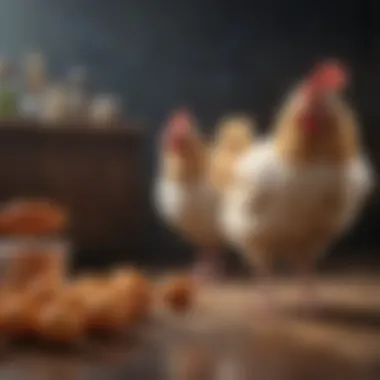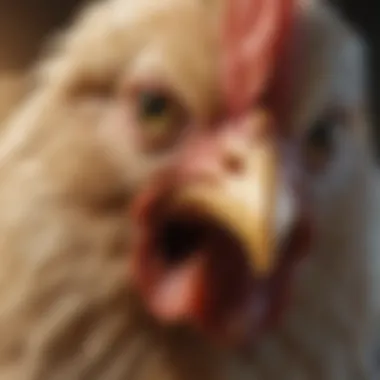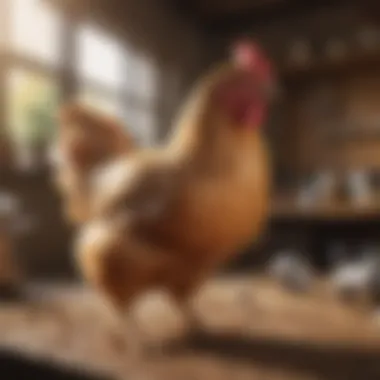Comprehensive Analysis of Flubenvet as a Chicken Wormer


Intro
Flubenvet is a prominent medication often used in poultry management, specifically as a chicken wormer. Understanding its effectiveness and application is crucial for those who care for chickens, whether for commercial purposes or personal enjoyment. Flubenvet contains the active ingredient flubendazole, which targets various intestinal parasites. But how does it work? In this article, we will explore its proper usage, dosage guidelines, safety considerations, and more. This comprehensive analysis aims to equip poultry enthusiasts with valuable information regarding Flubenvet's role in promoting chicken health and welfare.
Key Insights
In order to appreciate Flubenvet's impact, it's essential to delve into its formulation, proper administration, and effects on chicken populations. This includes:
- Understanding what flubendazole is and how it functions against parasites.
- Evaluating effective dosage based on chicken age and weight.
- Comparing safety profiles of Flubenvet with alternate worming medications.
- Investigating its regulatory status and implications for use in various jurisdictions.
This article also emphasizes sustainable poultry practices. By understanding Flubenvet, chicken owners can make informed decisions that support the health of their flocks while promoting responsible animal husbandry.
Prolusion to Flubenvet
The management of poultry health is crucial for any poultry owner, whether for personal use or commercial purposes. Flubenvet is a widely recognized medication in this context. It serves primarily as an effective wormer for chickens, addressing a common yet often overlooked issue in avian health. Understanding Flubenvet necessitates examining its historical context, active ingredients, and its impact on poultry care. This analysis will clarify its significance and practical applications.
Historical Background
Flubenvet's development stemmed from a need to secure healthier livestock, particularly focusing on the critical issue of parasite management. Initially introduced in the late 20th century, it was formulated in response to emerging resistance seen with earlier wormers. The formulation was designed to target specific worms that affect chickens without causing undue harm to the birds or the environment. Over the years, studies have evaluated its efficacy and safety, further solidifying its place in poultry care.
Importance in Poultry Care
The role of Flubenvet in poultry health cannot be understated. Worm infestations can severely impact the growth and productivity of chickens. Symptoms of such infestations may include stunted growth, poor feathering, and general lethargy. By utilizing Flubenvet, poultry owners can effectively manage these infestations, ensuring their flocks remain healthy and productive. Also, Flubenvet's mode of administration is straightforward, allowing for easy integration into existing husbandry practices. Overall, the importance of Flubenvet lies in its ability to enhance the well-being of chickens, thereby supporting the sustainable practices of poultry management.
Understanding Worm Infestations
Understanding worm infestations is crucial for maintaining the health of chickens. The presence of worms can severely affect the overall well-being of these birds, leading to various health issues. A proper grasp of this topic helps poultry owners take preventative measures and ensure better management of their flocks. This section outlines the significance of recognizing worm infestations and understanding their effects on poultry.
Common Types of Worms in Chickens
Chickens are susceptible to several types of worms, each with distinct characteristics and effects on health. The most common types include:
- Roundworms: These are among the most prevalent parasites in chickens. They live in the intestines and can grow significant lengths, leading to blockages and malnutrition.
- Capillaria (Hairworms): These worms are thinner and can inhabit the intestines, crop, or esophagus of chickens. They can cause digestive issues and hinder nutrient absorption.
- Tape Worms: These flat, segmented worms attach to the intestinal walls. They can lead to weight loss and general weakness, particularly in young birds.
Recognizing the signs of these worm types is important for effective management and treatment. Symptoms of infestations often include weight loss, lethargy, and poor egg production.
Impact of Worms on Chicken Health
Worm infestations can have profound effects on chicken health. The presence of these parasites can lead to:
- Malnutrition: Worms consume nutrients that should be available to the host. This leads to deficiencies in essential vitamins and minerals.
- Weight Loss: Infected chickens often experience significant weight loss, which can weaken them and make them more vulnerable to diseases.
- Impaired Immune Function: The body's immune response can be compromised due to the stress of dealing with a parasite load. This makes chickens more susceptible to other illnesses.
- Reduced Egg Production: For laying hens, a worm burden can negatively impact egg production and quality, causing economic losses for poultry farmers.
Overall, understanding these impacts emphasizes why it is vital to monitor for signs of worm infestations and take proactive measures. Owners should be informed about the signs of infection and the need for timely processing to keep their flocks healthy and productive.
Active Ingredients of Flubenvet
Flubenvet serves a crucial role in poultry health, primarily due to its scientifically formulated active ingredients. Understanding these components is essential for poultry owners as it allows them to make informed decisions about medication use in chickens. The active ingredients in Flubenvet are specifically designed to target resistant worms and minimize the impact they have on chicken health.
This section will breakdown the mechanism of action and efficacy against specific worms, providing a detailed insight into how Flubenvet operates at a molecular level. Knowing the exact nature of these active ingredients is fundamental for assessing both the effectiveness and safety of the treatment in your flock.
Mechanism of Action
Flubenvet’s primary active ingredient is flubendazole, a benzimidazole derivative. It functions by disrupting the metabolism of the parasites it targets. Flubendazole inhibits the polymerization of tubulin into microtubules, which is crucial for cell division in worms. When these processes are interrupted, it leads to the immobilization of the worms, ultimately resulting in their death.


This action does not affect the host's cells, making Flubenvet a selective treatment option. The rapid absorption and metabolism of flubendazole also contribute to the low toxicity profile seen in chickens, which is a significant consideration for poultry owners.
"Flubendazole works by targeting the cellular structure of worms, which helps maintain chicken health effectively."
Efficacy Against Specific Worms
Flubenvet is effective against a variety of worms commonly found in chickens, including roundworms and cestodes. Specific species include:
- Ascaridia galli (large roundworm)
- Heterakis gallinarum (cecal worm)
- Syngamus trachea (gapeworm)
Studies show high efficacy rates with minimal reinfection risks, especially when incorporating Flubenvet into a structured worming cycle. For instance, research indicates that the treatment can achieve over 90% efficacy in removing these parasites from infected flocks. This level of effectiveness ensures that chickens can absorb nutrients better, improve egg production, and overall maintain a healthier life.
Dosage and Administration
Dosage and administration are crucial components in the effective use of Flubenvet as a chicken wormer. Understanding the correct doses ensures that chickens receive adequate treatment for worm infestations without the risk of underdosing or overdosing. Accurate dosing contributes to the overall health of the poultry, reduces the potential for side effects, and enhances the efficacy of the medication. The success of worming programs greatly relies on good management practices, which include precise dosing and adapting to the needs of the flock.
Recommended Dosage Guidelines
The recommended dosage of Flubenvet is essential knowledge for any poultry owner. Generally, the dosage varies based on the age and weight of the chickens. For adult birds, the common practice involves mixing Flubenvet into their feed. A typical guideline involves using 1 kg of Flubenvet per ton of feed. It is important to follow the specific instructions provided by the manufacturer, as the concentration may vary. Adjustments may be needed based on the flock's size and the severity of the infestation.
To ensure the effectiveness of the treatment, feeding the medicated feed for a continuous period of seven days is recommended. It is imperative to read the product label closely for specific details such as withdrawal periods, which are the intervals after the last treatment during which eggs or meat should not be sold for human consumption.
"Proper dosage not only affects effectiveness but also plays a role in preventing resistance among worms, making it a critical aspect of worm management."
Methods of Administration
The methods of administering Flubenvet vary, but the most common route is oral. Poultry owners usually opt to include Flubenvet in the daily feed. This method is effective as it allows for easy consumption by the chickens. However, ensuring that all birds consume the medicated feed is essential for uniform treatment across the flock.
Alternatively, Flubenvet is also available in drinking water, although this method is less common for chickens due to the risk of incomplete dosage. When using water, it is crucial to ensure that chickens have exclusive access to that source, avoiding other water supplies during the treatment period.
It is also worth noting that administering Flubenvet through pellets or treats designed for medicating livestock is an effective strategy. This method may be used especially for smaller or more selective eaters within the flock.
By adhering to the suggested guidelines, poultry owners can maximize the benefits of Flubenvet, resulting in healthier chickens and improved productivity.
Efficacy and Research Findings
The efficacy of Flubenvet as a chicken wormer is critical for ensuring optimal health in poultry. Understanding its effect on parasitic infections can help poultry owners make informed decisions. Effective worming not only enhances chicken growth but also improves egg production, immunity, and overall well-being. Research findings in this area are pivotal, as they provide scientific evidence supporting the various claims related to Flubenvet’s effectiveness against specific worm infestations.
Clinical Studies on Flubenvet
Several clinical studies have been conducted to evaluate the effectiveness of Flubenvet in controlling worm infections in chickens. These studies indicate that Flubenvet operates well against the most common types of worms affecting poultry. Notable studies, such as those published in veterinary journals, reveal substantial reductions in worm counts following treatment.
In these trials, groups of chickens were administered Flubenvet, and their health was monitored over defined periods. Key observations included:
- Reduction in Worm Load: Most studies show that Flubenvet reduces worm loads effectively.
- Improvement in Health Markers: Chickens treated with Flubenvet typically show improved health indicators, like weight gain and better feed conversion rates.
- Long-lasting Effects: The studies often highlight that the efficacy of Flubenvet persists beyond the treatment duration, thus providing lasting protection against reinfestation.
Regular use within proper guidelines ascertains the health of your poultry. The studies affirm that Flubenvet is integral in managing internal parasites effectively.
Field Trials and Outcomes
Field trials offer valuable insights into the practical administration of Flubenvet in real-life settings. These trials are essential for understanding how the drug performs outside of controlled environments. Outcomes from such trials often reflect the challenges and variances encountered in actual poultry farming.
Outcomes of field trials typically involved:


- Real-world Efficacy: The effectiveness of Flubenvet in various poultry operations was assessed. Data consistently shows that when used as instructed, Flubenvet significantly controls worm populations in live chicken flocks.
- User Experience: Farmers reported ease in administration and noticeable improvements in their chickens’ health. This sort of anecdotal evidence complements clinical data by providing a fuller picture.
- Economic Advantages: Many trials also considered the cost implications of using Flubenvet. The investment in this wormer often leads to better growth rates and lower mortality, making it a financially sound choice for poultry farming.
In summary, both clinical studies and field trials establish Flubenvet’s role as a reliable and effective wormer for chickens, emphasizing its significant contributions to poultry health and farm productivity. Through sound research, poultry owners can adopt best practices tailored to their specific needs.
Safety and Side Effects
Understanding safety and side effects is crucial when using Flubenvet as a chicken wormer. Ensuring the well-being of poultry is a primary concern for any poultry owner or enthusiast. This section delves into the potential side effects that may arise from Flubenvet use and outlines necessary precautions and contraindications. Awareness of these factors can enhance the safety of treatment regimens and help maintain the health of the flock.
Potential Side Effects in Chickens
Flubenvet is generally recognized as safe when used according to the provided guidelines. However, it is not without potential side effects. Chickens may experience mild reactions to the medication. Some common side effects include:
- Drowsiness: Some chickens may appear less active than usual after administration.
- Reduced Appetite: They might show a temporary decrease in food intake.
- Digestive Issues: Mild diarrhea can occur in some cases.
While these side effects are usually mild and temporary, it is important to monitor the flock closely after treatment. Any signs of distress should prompt immediate consultation with a veterinarian to ensure that no serious complications are developing.
Contraindications and Precautions
Knowledge of contraindications is essential for responsible use of Flubenvet. There are specific scenarios where using Flubenvet is not advisable:
- Pregnant or Laying Hens: Use in these groups should be avoided unless directed by a veterinarian, as it may affect egg production or the developing chicks.
- Combination with Other Medications: Flubenvet should not be administered alongside other wormers without professional guidance. This can lead to adverse interactions.
Precautions to consider include:
- Follow Dosage Recommendations: Adhering strictly to suggested dosages minimizes the risk of side effects.
- Observe Poultry Closely: Before and after treatment, observations for changes in behavior or health can help identify potential issues early.
Failure to observe these contraindications and precautions may lead to greater health threats for chickens. Therefore, poultry owners should approach the use of Flubenvet with caution.
Regulatory Aspects of Flubenvet Use
The regulatory landscape surrounding Flubenvet is essential for its safe and effective use in chicken health management. Understanding these regulatory aspects not only ensures compliance for poultry owners but also aids in ensuring the well-being of the livestock. Regulatory frameworks provide guidelines that govern how and when Flubenvet can be used, its approval process, and the requirements for labeling.
Approval and Licensing
Flubenvet has undergone rigorous testing to achieve its approval by regulatory bodies. These organizations, such as the Veterinary Medicines Directorate (VMD) in the UK, assess the safety, efficacy, and quality of veterinary products before granting a license. The approval process involves comprehensive clinical trials that demonstrate Flubenvet's effectiveness against parasites while ensuring it does not pose undue risk to chickens or humans handling the medication. Thorough assessments consider factors like dosage, potential side effects, and environmental impact.
The licensing system also helps maintain product quality. Manufacturers must adhere to strict manufacturing practices, which include consistent ingredient sourcing, quality control, and responsible marketing practices. This licensing ensures poultry owners receive a reliable product that meets safety standards. A license can be revoked or suspended if the product fails to meet safety or efficacy criteria after entering the market.
Labeling Requirements
Labeling for Flubenvet must accurately inform users of the correct usage and precautions. The requirements specify information that must be clear and accessible. A proper label includes:
- Product Name: Clear identification of the medication.
- Active Ingredients: Detailed list of ingredients and their concentrations.
- Dosage Instructions: Specific guidelines on how to administer the product, including quantity and frequency.
- Safety Warnings: Information about potential side effects and contraindications.
- Withdrawal Period: Indication of how long to wait before consuming eggs or meat from treated chickens.
Proper labeling not only aids poultry owners in using Flubenvet effectively but also promotes responsible usage practices. Labels should be understandable to a general audience to avoid misuse. This is particularly important as improper use can lead to decreased effectiveness and contribute to the development of resistant worm strains.
Always consult with a veterinarian before starting any worming treatment, as they can provide tailored advice specific to your flock's health needs.
In summary, understanding the regulatory aspects of Flubenvet use is crucial for ensuring safety and efficacy in poultry health. Approval and licensing ensure that the product is safe, while strict labeling requirements provide the necessary information for effective and responsible usage.
Alternatives to Flubenvet
Exploring alternatives to Flubenvet is vital in poultry management. While Flubenvet serves as an effective solution for controlling worm infestations in chickens, having knowledge of other options allows poultry owners to make informed decisions. Each alternative comes with its unique benefits and considerations. By understanding these options, owners can choose the best course of action for their birds while promoting animal welfare and health management practices.


Other Chemical Wormers
Chemical wormers provide a reliable method for treating worm infestations. In this section, we will discuss some notable alternatives to Flubenvet. These include:
- Pyrantel Pamojate: This is an anthelmintic that targets various types of worms. It works efficiently against roundworms in chickens. Its ease of administration makes it suitable for many poultry owners.
- Ivermectin: This medication has broad-spectrum efficacy against both internal and external parasites. Chicken owners often appreciate its versatility.
- Levamisole: Commonly used for livestock, levamisole can also treat chickens effectively. It acts as an immunostimulant while controlling certain types of worms.
When selecting a chemical wormer, consider the type of worms present in your flock. Always follow dosage guidelines strictly to ensure the health and safety of the chickens.
Natural Remedies and Their Efficacy
For those seeking alternatives outside of chemical treatments, several natural remedies have gained popularity. Many poultry owners prefer these options due to the perceived benefits of organic farming and fewer chemical residues. Some notable natural remedies include:
- Diatomaceous Earth: This powdery substance can disrupt the exoskeleton of worms. It is often sprinkled in the chicken's living area to prevent infestations.
- Garlic: Known for its health benefits, garlic can also act as a natural worm deterrent. Adding small amounts to chicken feed may help support a healthy digestive system.
- Apple Cider Vinegar: Administering diluted apple cider vinegar in drinking water can create an environment less conducive to worms.
- Pumpkin Seeds: Some studies suggest that pumpkin seeds possess properties that may effectively paralyze worms, leading to their expulsion from the body.
Understanding these alternatives allows poultry enthusiasts to maintain optimum chicken health while adapting to their poultry management practices.
Integrating Flubenvet into a Worming Schedule
Integrating Flubenvet into a worming schedule is crucial for maintaining optimal health in poultry. This integration aids in systematically managing parasite populations, ensuring that chickens are less susceptible to infestations. The timing and approach to implementing Flubenvet can affect its efficacy and the overall health of the flock. Therefore, understanding how to weave this treatment into existing health practices is essential for poultry owners.
Timing of Treatment
Determining the timing of treatment with Flubenvet requires attention to life cycles of common parasites. Worms such as roundworms and caecal worms may have specific times of year when they are more prevalent due to environmental factors.
- Parasite life cycle assessments should be conducted regularly.
- Administering Flubenvet during peak infestation periods can drastically reduce worm populations.
- A two to three times a year schedule is often recommended, but this may vary depending on farm conditions.
Additionally, factors like age and living conditions, such as outdoor access and sanitation practices, need consideration. Younger birds or those with weaker immune systems may require more frequent treatments compared to established chickens.
Monitoring Efficacy
Monitoring efficacy of Flubenvet helps poultry owners determine whether their worming regimen is effective. Observations should include:
- Regular assessments of chickens for signs of worms or health issues. This includes checking for lethargy, change in appetite, or weight loss.
- Conducting egg count tests for worm eggs in chicken droppings can provide quantitative data on effectiveness.
- Keeping detailed records of treatment dates and observed health changes helps in adjusting future worming schedules.
Using feedback from these observations, owners can fine-tune their approach. If decreased efficacy is noted, it might necessitate an evaluation of dosage, administration methods or even consideration of alternative worming options.
Regular monitoring ensures treatment remains effective and contributes to sustainable poultry management.
Culmination and Recommendations
In the realm of poultry care, the use of Flubenvet as a chicken wormer emerges as a critical component for maintaining flock health. The conclusion of this comprehensive analysis reaffirms the significance of Flubenvet in both treating and preventing parasitic infestations in chickens. By understanding the intricate details surrounding this medication, poultry owners can make informed decisions that positively impact their birds' well-being.
The recommendations presented in this section aim to distill the key insights shared throughout the article while emphasizing practical steps that owners can take. Implementing these practices can lead to improved health outcomes and a more resilient poultry operation.
Summary of Key Insights
Flubenvet stands out as a targeted treatment against various types of worms commonly found in chickens. Its active ingredient, flubendazole, acts by disrupting the energy metabolism of parasites, ensuring their ineffective feeding and reproduction. Findings from clinical studies illustrate the efficacy of Flubenvet in significantly reducing worm burdens, which corresponds to enhanced overall health in affected birds.
Key aspects to remember include:
- Active Ingredients: Flubendazole is the primary chemical responsible for its anti-parasitic action.
- Dosage: Administering the precise dosage is crucial for treatment success. Deviating from recommended guidelines can lead to ineffective treatment or potential health risks.
- Safety Considerations: While generally safe, awareness of potential side effects is necessary. Monitoring your flock during and post-treatment is essential.
- Alternatives: Exploration of alternatives allows for a blended approach to worm management, reinforcing the importance of adaptation in treatment strategies.
Best Practices for Poultry Owners
To maximize the benefits of Flubenvet while ensuring optimal chicken health, poultry owners should adopt several best practices:
- Timely Treatment: Administer Flubenvet at regular intervals as part of a preventive medicine program. This aids in reducing the likelihood of infestations.
- Observation: Regularly monitor the flock for signs of worms or general health issues. Early detection can significantly influence the successful management of parasitic infestations.
- Consultation with Veterinarians: Engaging with poultry health experts can provide customized advice and support based on specific flock needs.
- Maintain Clean Conditions: Keeping the living environment clean is crucial in minimizing the risk of reinfection.
- Rotate Treatments: Consider alternating worming products to avoid resistance development among parasites.
Adhering to these practices can create a robust strategy for managing chickens' health, giving poultry owners the confidence to deal effectively with parasitic challenges. As the poultry industry continues to evolve, staying informed about products like Flubenvet will remain vital in ensuring sustainable poultry management.







